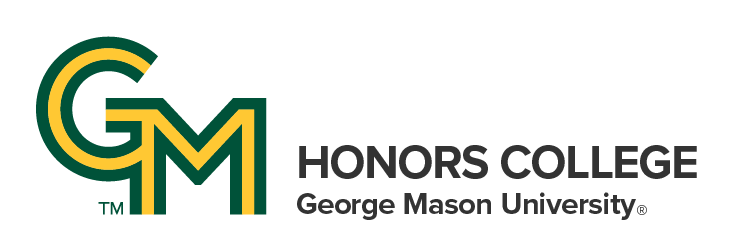Transfer Student Frequently Asked Questions
The Honors College is a place where George Mason’s most determined and inquisitive students work together to ask questions that allow them to engage with our world in meaningful ways. Transferring can be a daunting experience, and this page answers some common questions about the Honors College and the application process.

Frequently Asked Questions
What is the Honors College?
An enhanced opportunity for the most motivated students from all majors at Mason.
- Curriculum: The Honors College offers an enhanced alternative general education curriculum comprised of small, highly interactive seminar-type classes.
- Programming: The Honors College offers co-curricular programming to help students excel academically, connect socially, and pursue the things they care about most.
- Support: You will receive additional support from an Honors College advisor, help navigating your transition, and extra help if you run into challenges along the way.
What distinguishes the Honors College curriculum?
We focus on inquiry-based, civic, and experiential learning.
- Research: 100% of Honors College students begin conducting individual research their first semester. 44% conduct research with a faculty mentor before graduating.
- Civic Learning: All Honors College students take a civic learning course, and our curriculum emphasizes putting significant questions in their broader social and historical context. Over a dozen nonprofits are chosen to partner with us each year.
- Experiential Learning: Students may participate in hands-on classes that develop professional skills. Dozens of companies, nonprofits, and government institutions have partnered with students in our classes. Additionally, many students have the opportunity to participate in campus-focused experiential learning with the Early Identification Program, through Peer Mentorship programs, and more.
What is the value of the Honors College experience?
Learn with a community that inspires you to do your best.
- At George Mason, Honors College student graduation rates are 32% higher than the national average. Before graduation, 80% of Honors College students are in registered student organizations, with over half in leadership roles; 63% participate in service work; 73% have internships.
- In Grad School: Honors College grads attend the most prestigious graduate, law, and medical schools, from Harvard to Stanford and from UVA to University of California.
- Top Careers: Honors College grads work in leadership positions in every industry and field - in law firms, health systems, corporations, and the government.
Who is my Honors College advisor?
Information about Honors College advising, including a list of advisors, can be found here.
How can I connect with the Honors College and my peers?
Interested students can join any of the Honors College student organizations listed below. Information about opportunities and events can also be found on the weekly Honors College newsletter.
- Honors College Recruitment Team
- Honors College Connects
- Honors College Student Advisory Board
- Honors College Peer Mentors
- Honors College Communications Team
Does it cost more to join the Honors College?
No. Students pay no additional tuition or fees to participate in the Honors College.
Can I receive scholarships for joining the Honors College?
No. The Honors College does not award transfer students specific scholarships to join. However, after students matriculate to the Honors College, they can choose to apply for specific Honors College scholarships. Applying for an Honors College scholarship does not guarantee that you will receive it.
How will my credits transfer?
The Honors College will evaluate the classes you’ve taken and award appropriate credit.
-
Credit from before George Mason. After admission, the Honors College will evaluate transfer, AP/ IB, and dual enrollment credits and determine if they can be used as substitutes for relevant Honors College curriculum requirements. Students can receive credits that substitute for a maximum of 4 of the 7 required Honors College seminars.
-
Natural science and math. Natural science and math classes used to fulfill major requirements are accepted by the Honors College. You will have the option to take enhanced H-sections available for certain classes.
-
Other George Mason credits. Admission to the Honors College does not impact your progress towards fulfilling major/minor requirements nor any elective credits you have earned as transfer credit.
-
Minimum requirements. At a minimum, Honors College students must take 3 HNRS seminars:
-
3-4 credits: Foundations of Inquiry and Research - HNRS 110 + 111 or 302
-
3 credits: Civic Engagement - HNRS 260 or 261
-
3 credits: Multidisciplinary Challenges - HNRS 360 or 361
-
This chart illustrates the list of Honors College seminars that can be substituted.
Reading the Art
Identity, Community, and Difference
Contemporary Social Issues
Reading the past
To plan accordingly, the Honors College Planning Form is available. This form assists you in understanding where you stand in terms of the Honors College requirements and Mason Core requirements.
How does the Honors College curriculum relate to the Mason Core?
The Honors College curriculum is an alternative to the Mason Core. Students complete the Honors College curriculum requirements instead of the Mason Core Foundation and Exploration requirements.
How do I apply?
When applying to transfer with the George Mason online application, be sure to apply to the Honors College if you have a 3.5 cumulative GPA & have completed 12-24 credits at an accredited college or university.
Letters of recommendation. Letters of recommendation are not required but will be reviewed if submitted.
